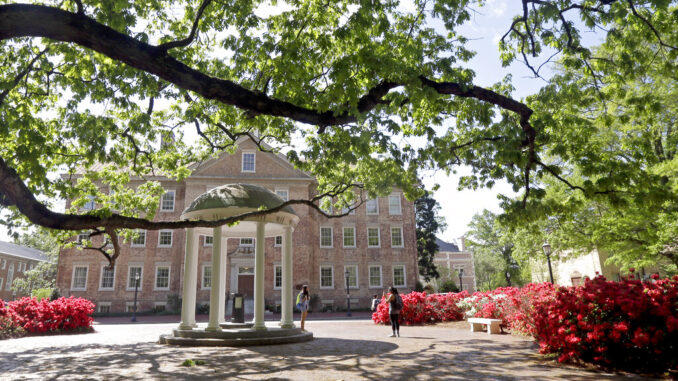
The Israeli-Palestinian conflict, with the involvement of Hamas, has drawn widespread attention. However, it is sad that it took an international crisis to bring into focus an issue that has long persisted on the campus of the University of North Carolina at Chapel Hill (UNC) ― cancel culture.
Cancel culture has been used to describe the censorship or exclusion of individuals with dissenting views and has been present for years in academic institutions. The recent confluence of events highlights the administration’s long-overdue acknowledgment of this issue and its impact on the campus environment.
On Friday, Oct. 13, 2023, UNC Chancellor Kevin Guskiewicz released a statement condemning the acts of terror in Israel by Hamas and offering resources to the Carolina community. A few paragraphs into his statement, he said “Let me be clear ― we will not stand for acts of violence on our campus,” pointing to his commitment to allow groups to express their opinions under the First Amendment without suppression to engage in civil discourse and educated debate. The same day, UNC’s Students for Justice in Palestine held a protest on the steps of Wilson Library which was met by a counter protest from pro-Israel students.
During this protest, Israeli counter-protestor and Associate Professor in the UNC Department of Religious Studies, Evyatar Marienburg, clashed with pro-Palestinian demonstrators and was pushed and had a drink thrown on him. He was the only known individual to be escorted away from the protest, not any of the pro-Palestinian protestors proving that cancel culture thrives on violence, not the exploration of truth and freedom of thought.
Cancel culture is not a novel phenomenon; it has been prevalent on college campuses across the United States for some time now. It often involves the doxing of conservative and religious students, creating an atmosphere where these individuals are marginalized and silenced. The situation in Chapel Hill is no exception, as students who dare to express dissenting opinions or embrace conservative or religious beliefs often face harassment, threats, and social ostracization. This climate, fueled by an intolerance for opposing viewpoints, has only intensified with the recent events in the Middle East.
This isn’t the first time UNC has had a problem with protests turning violent. On Aug. 20, 2018, a group of UNC students and community members toppled the Confederate statue of Silent Sam on UNC’s campus. They resorted to mob rule and, using ropes, they crowded the statue and took matters into their own hands. The statue had long been a target of students and community members, a symbol of history that they wanted to destroy. The fact that the statue is still in an unknown location and not returned to campus or displayed elsewhere signaled to this group of students that violence not only grabs attention but leads to desired results.
Free speech ceases to exist when violence and destruction or degradation of property is present. University presidents and administration should establish a bright line and expel any student or faculty member who engages in bodily contact with another individual during such demonstrations. It is one thing to shout, whether respectful or not, but it is absolutely unacceptable and contradictory to free speech when physical intimidation is utilized.
The connection between the Israeli-Palestinian conflict and cancel culture might seem tenuous at first, but it underscores the extent to which the stifling of free speech has permeated UNC and many other institutions. When a campus community becomes hostile to any form of dialogue or debate, the consequences can be severe. This situation has created a tense environment that stifles free and unfettered speech and ignores civility.
When students are afraid to express their views, when open dialogue is stifled, and when individuals are targeted for their beliefs, the core values of academic institutions are undermined. Universities should be places of intellectual exploration and free expression, where diverse perspectives are welcomed and debated. When cancel culture is allowed to thrive, it runs counter to these fundamental principles.
Moreover, cancel culture creates division and polarization. Rather than fostering a spirit of unity and understanding, it pits students against each other based on their beliefs. This divisiveness can have long-lasting negative effects on the campus community and its ability to tackle important social and academic issues collectively.
It is indeed a sad state of affairs that it took an international crisis like this to prompt UNC administration to address the presence of cancel culture on their campus. This issue has persisted for years, and its impact is deeply concerning. The question of whether cancel culture has gone too far is not a matter of opinion; it is a clear threat to the values of free speech and open debate that universities are supposed to uphold.
It is time for academic institutions, including UNC, to actively work to reverse the stifling effects of cancel culture and restore the principles of free and unfettered speech. Only through open dialogue and constructive engagement can we hope to create a more intellectually vibrant campus environment.
Maggie Horzempa is an alum of UNC Chapel Hill and a board member of UNC AFSA
